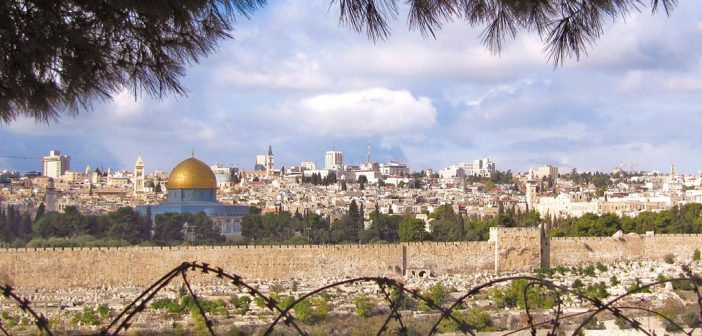As the Israeli-Palestinian conflict continues to foment unrest in the Middle East, the University’s Peace and Justice Studies, Jewish Studies, and Middle Eastern Studies programs will host a discussion with representatives of Givat Haviva, a pioneering organization of Jewish-Palestinian reconciliation.
The event, “The Roadmap for A Shared Society, or How Jews and Arabs Can Live and Prosper Together ” will feature conversations on how Israeli Jews and Palestinians can successfully create an inclusive society.
It will be held on March 30 in the Flom Auditorium at the Rose Hill campus at 12 p.m., and is part of a series of lectures and workshops at Fordham focused on the longstanding Israeli-Palestinian conflict. The event is free and open to the public.
“It is an event of vital importance,” said John Davenport, Ph.D., an associate professor of philosophy and director of the Peace and Justice Studies program. “It feels as if real dialogue and negotiation toward a two-state peace deal has almost stopped in recent years, despite many rounds of effort to get it restarted.”
“The Givat Haviva group represents a different side of the story and showcases Israelis, both Jewish and Arab, working together.”
Yaniv Sagee, executive director of Givat Haviva, and Mohammad Darawshe, director of the Center for Equality and Shared Society, will discuss Givat Haviva’s programming. The organization is working with Jews and Arabs to build an inclusive society in Israel based on mutual responsibility, civic equality, and a shared vision of the future.
“This is a golden opportunity to really witness a current-affairs issue in real time, with a protagonist who is leading major conflict resolution efforts in Israel,” said Samuel Peleg, Ph.D., a visiting professor of political science who will be moderating the discussion.
According to Peleg, an expert in conflict resolution, previous attempts to resolve the conflict in the Middle East have largely used a top-down approach, which involved politicians, officials, generals and other decision makers working to create a “forced” solution for the people. He said Givat Haviva, which was awarded the United Nations Educational, Scientific and Cultural Organization (UNESCO) Prize for Peace Education, is instead tackling the issue from the bottom-up by working directly with people on the grounds of the conflict.
“Givat Haviva is bringing together Israeli Jews and Israeli Palestinians to get to know one another as people first, to get rid of categorical thinking,” he said. “This breaks down the barriers.”
Though the road to reconciliation has been difficult, Peleg said Givat Haviva’s efforts to reduce mistrust among Arabs and Jews through a common identity could help both groups look beyond their national, religious, and cultural differences.
“There is a message here that every conflict—even those that seem difficult to tackle— can be resolved,” he said.



